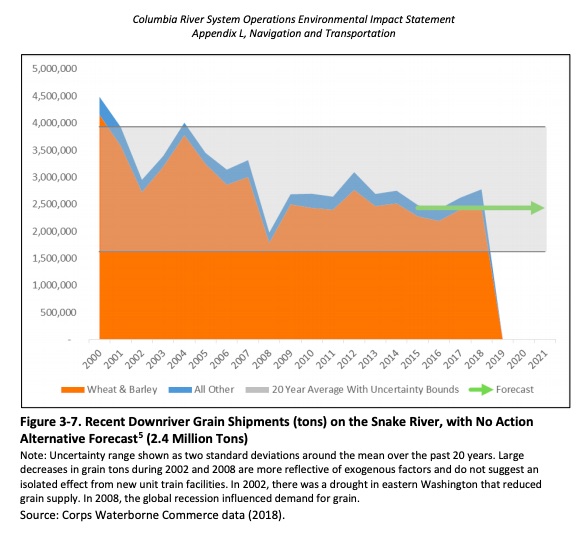forum
library
tutorial
contact

Ag Groups say Simpson
Dam Plan Poses Threat
by Matthew Weaver
Capital Press, April 5, 2021
|
the film forum library tutorial contact |

|
Ag Groups say Simpson
by Matthew Weaver
|
"Every line in (Simpson's proposal) represents either a significant shift in federal policy, funding or infrastructure,"
-- Kristin Meira, executive director of the Pacific Northwest Waterways Association
 Representatives of Northwest agriculture believe U.S. Rep. Mike Simpson's plan to tear down four dams on the Snake River is unlikely to go anywhere in Congress, but say that it poses a particular threat to their industry.
Representatives of Northwest agriculture believe U.S. Rep. Mike Simpson's plan to tear down four dams on the Snake River is unlikely to go anywhere in Congress, but say that it poses a particular threat to their industry.
Simpson has floated a $33.5 billion plan to boost salmon recovery, remove four dams on the lower Snake River and impose a 35-year moratorium on dam-related environmental litigation. He said he would incorporate feedback from farm groups "where possible."
No legislation has been introduced.
The plan has drawn opposition from agricultural stakeholders, power companies and environmental groups.
When Simpson first announced the plan in February, he suggested that it could be included in President Joe Biden's $2 trillion to $3 trillion national clean energy stimulus bill.
"We believe the details of the Biden plan will become more clear in the coming months and it is too early to make a determination of what will be included in the final bill," a representative of Simpson told the Capital Press.
The Idaho Farm Bureau Federation believes Simpson's plan poses more of a threat to agriculture because it is a "very specific plan," putting a dollar figure and timeline on dam removal, said Sean Ellis, the Farm Bureau's spokesman.
Simpson's plan doesn't appear to have support in Congress, Ellis said.
"Idaho Farm Bureau hopes it fades away for good," he said. "We will continue to vigorously oppose this plan, if it moves forward in the current language or different language."
"Any time you have a leader in the Northwest express openness to the idea of removing significant pieces of federal infrastructure, it gets people's attention," said Kristin Meira, executive director of the Pacific Northwest Waterways Association.
Meira agrees that Simpson's plan is not ripe for immediate movement this year.
"Every line in (Simpson's proposal) represents either a significant shift in federal policy, funding or infrastructure," Meira said. "Every single line would need to have likely years of significant federal study and likely major changes to authorization before anything new or different would ever take place. These are not small actions that are being proposed."
A moratorium on litigation would require significant changes to "bedrock" environmental laws, Meira added.
"There is not a special set of laws in the Northwest that provides exemptions or special dispensation for our projects when compared to other regions," she said. "That element of the congressman's proposal is one that we feel is unlikely to be able to move forward."
The idea of dam removal has been around for a long time and will likely continue, said Glen Squires, CEO for the Washington Grain Commission.
Simpson's plan may pose more of a threat than other proposals, Squires said, but "the underlying facts remain the same, and even Rep. Simpson isn't sure the whole scheme will actually recover salmon."
Meira and Squires say some elements of the plan do need support, such as predator control.
Simpson's focus on increased funding for salmon recovery should move forward "straight away," Meira said.
"I think that's something that every single resident of the Northwest can support, as long as that funding and those actions are in pursuit of science-based efforts that will have demonstrable benefits for fish runs and the species that rely on our fish, like orca," she said.
Simpson's plan ultimately provided a "unique opportunity" to better explain to the region what the dams mean for agriculture and hydropower, Meira said.
A continued "very narrow focus" on removing the dams gets the conversation off-track and ultimately doesn't help Northwest fish, she said.
learn more on topics covered in the film
see the video
read the script
learn the songs
discussion forum
